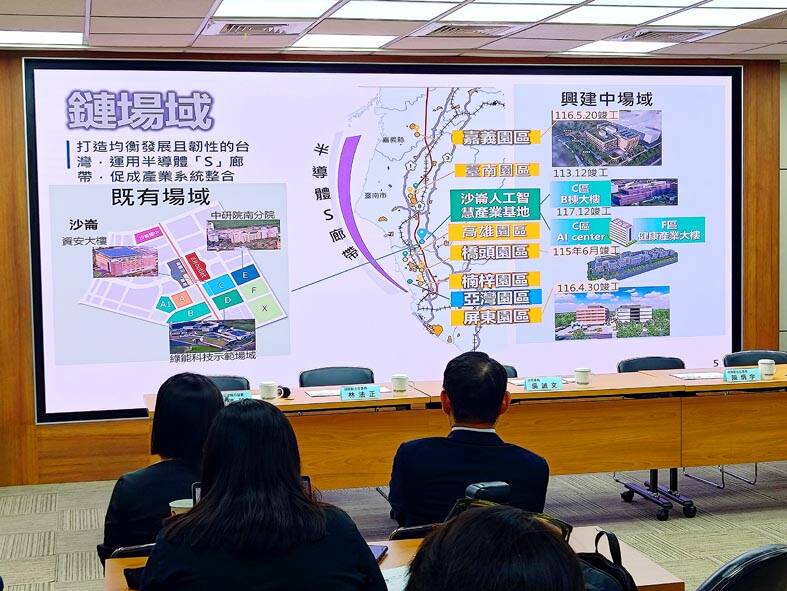The government plans to invest NT$36 billion (US$1.13 billion) over five years to build the foundations for southern Taiwan to become the next big technological center, National Science and Technology Council (NSTC) Minister Wu Cheng-wen (吳誠文) said yesterday.
President William Lai (賴清德), as part of his election campaign platform, proposed to “balance” development in Taiwan and make the nation a bastion of artificial intelligence (AI) technology, the council said.
The ministry’s proposed plan would start from next year to 2029, with NT$12 billion to be invested in increasing computation capacity, NT$17 billion building facilities and sites, and NT$7 billion in attracting talent and developing AI technology applications.

Photo: Wu Po-hsuan, Taipei Times
Wu said he hoped the project would grow relevant industries’ value 10-fold by the time of the project’s conclusion.
Wu emphasized that the government would provide stable power for the project, adding that the Ministry of Economic Affairs would be involved in the decisionmaking process.
NSTC Vice Minister Su Chen-kang (蘇振綱) said the project would focus on Tainan’s Shalun Township (沙崙), which already houses the Executive Yuan’s Cyber Security & Smart Technology Research & Development Building — a test site for innovative technology — Academia Sinica’s southern branch and the Green Energy Technology Demonstration Site.
Shalun would serve as the nation’s development center for the AI industry, and when combined with the S-shaped semiconductor corridor policy, and policies to build up infrastructure in the Chiayi, Ciaotou and Pingtung science parks, it would make southern Taiwan a technological center, he said.
Making southern Taiwan a technological center would help systemically integrate different industries while creating a nation with balanced development, he added.
The project would also encourage 5,400 teachers across 15 vocational schools in southern Taiwan to develop different specialties and help educate 160,000 students, increasing their competitive edge and motivation to work, Su said.
Talent-fostering platforms and centers would attract AI-related workers to Shalun, which would ultimately help feed the talent pool when industries in southern Taiwan digitize, he said.
This would help concentrate talent, information and energy in the south, allowing the region to develop key industries such as information and communications techonology, defense, metal processing, automotive components, clean energy, smart farming, and healthcare and medicine, he said.
An NSTC official commenting on condition of anonymity said that the government’s total computation capacity stands at about 19 petaflops, and the project, alongside the Taiwan Chip-based Industrial Innovation Program, is expected to grow governmental computation capacity to 480 petaflops by 2028.
The S-shaped corridor policy is centered in Kaohsiung’s Nanzih District (楠梓), serving to connect manufacturers in Lujhu (路竹) and Ciaotou (橋頭) districts to the Tainan Science Park and also extends southward to Dashe (大社), Renwu (仁武), Daliao (大寮), Linyuan (林園) and Siaogang (小港) districts, forming a concentration of semiconductor-related industries.

Taiwan yesterday condemned the recent increase in Chinese coast guard-escorted fishing vessels operating illegally in waters around the Pratas Islands (Dongsha Islands, 東沙群島) in the South China Sea. Unusually large groupings of Chinese fishing vessels began to appear around the islands on Feb. 15, when at least six motherships and 29 smaller boats were sighted, the Coast Guard Administration (CGA) said in a news release. While CGA vessels were dispatched to expel the Chinese boats, Chinese coast guard ships trespassed into Taiwan’s restricted waters and unsuccessfully attempted to interfere, the CGA said. Due to the provocation, the CGA initiated an operation to increase

CHANGING LANDSCAPE: Many of the part-time programs for educators were no longer needed, as many teachers obtain a graduate degree before joining the workforce, experts said Taiwanese universities this year canceled 86 programs, Ministry of Education data showed, with educators attributing the closures to the nation’s low birthrate as well as shifting trends. Fifty-three of the shuttered programs were part-time postgraduate degree programs, about 62 percent of the total, the most in the past five years, the data showed. National Taiwan Normal University (NTNU) discontinued the most part-time master’s programs, at 16: chemistry, life science, earth science, physics, fine arts, music, special education, health promotion and health education, educational psychology and counseling, education, design, Chinese as a second language, library and information sciences, mechatronics engineering, history, physical education

The Chinese military has boosted its capability to fight at a high tempo using the element of surprise and new technology, the Ministry of National Defense said in the Quadrennial Defense Review (QDR) published on Monday last week. The ministry highlighted Chinese People’s Liberation Army (PLA) developments showing significant changes in Beijing’s strategy for war on Taiwan. The PLA has made significant headway in building capabilities for all-weather, multi-domain intelligence, surveillance, operational control and a joint air-sea blockade against Taiwan’s lines of communication, it said. The PLA has also improved its capabilities in direct amphibious assault operations aimed at seizing strategically important beaches,

‘MALIGN PURPOSE’: Governments around the world conduct espionage operations, but China’s is different, as its ultimate goal is annexation, a think tank head said Taiwan is facing a growing existential threat from its own people spying for China, experts said, as the government seeks to toughen measures to stop Beijing’s infiltration efforts and deter Taiwanese turncoats. While Beijing and Taipei have been spying on each other for years, experts said that espionage posed a bigger threat to Taiwan due to the risk of a Chinese attack. Taiwan’s intelligence agency said China used “diverse channels and tactics” to infiltrate the nation’s military, government agencies and pro-China organizations. The main targets were retired and active members of the military, persuaded by money, blackmail or pro-China ideology to steal